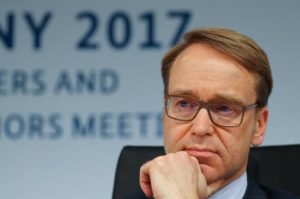The tug of war over the direction of ECB policy spilled into public last night as Germany's two representatives on its main policy-making body - J

German Bundesbank President Jens Weidmann
The tug of war over the direction of ECB policy spilled into public last night as Germany’s two representatives on its main policy-making body – Jens Weidmann and Sabine Lautenschlaeger – urged it to prepare to wind down its aggressive stimulus policy as soon as economic conditions allow it.
Its chief economist Peter Praet immediately shot back with comments that such a move would be premature, backing the ECB’s current guidance that rates will stay at the current level, or even fall, until well after the ECB’s bond-purchase programme ends. The ECB’s policy-setting Governing Council meets in a month’s time, still possibly too early for a clear change in tone. But with the euro zone economy starting to look increasingly healthy, the hawks will be sharpening their arguments in the months to come.
The major candidates for the French presidential election Emmanuel Macron, Marine Le Pen and Francois Fillon all present their economic programmes to the Medef employer’s federation today. All will be hoping the influential group will give them the “business-friendly” imprimatur.
Meanwhile, Benoit Hamon, the candidate of the ruling Socialist Party, travels to Berlin to have his meeting with Chancellor Angela Merkel, who has said she will meet all the main contenders
apart from Le Pen. Hamon will visit a refugee centre, in a nod of support to Merkel’s decision in 2015 to open the doors to many thousands of Syrian and other refugees.
A day before British PM Theresa May is due to pull the Brexit trigger, the Scottish assembly in Edinburgh is due to grant First Minister Nicola Sturgeon authority to demand a second independence referendum.
MARKETS AT 0755 GMT
World markets appear reluctant to throw in the towel on global reflation trades despite U.S. President Donald Trump’s setback last week in failing to push through his healthcare proposals. That’s partly due to hopes the new administration will now prioritise his more market-sensitive tax cut plan but also because incoming economic activity readings and earnings projections worldwide continue to impress regardless of creeping doubts in Washington about Trump’s ability to deliver on campaign promises.
But with White House officials on Monday saying they’re eyeing an August target date for tax reform and many economists now doubting the extent of what Trump can get through Congress, the fizz from the fiscal stimulus story at least looks to be going flat.
After hitting its lowest level since mid February on Monday, the S&P500 rebounded to close just 0.1 percent lower and the Nasdaq actually closed higher on the day. Major Asia stock markets were mostly higher earlier, with Tokyo outperforming as the dollar bounced against the yen but with HK and Seoul up too. Shanghai and Jakarta bucked the trend, but the broad MSCI emerging markets index is higher on the day.
More generally the sweep of so-called “Trumpflation” trades, which have been steadily unwound over recent weeks, have stabilized somewhat. The dollar index is higher and euro/dollar has retreated after Tuesday’s brief pop above $1.09 for the first time since November. Ten-year Treasury yields are a touch higher too at 2.38 percent and Brent crude oil prices firmed to just under $51.
A day before formal Brexit talks are due to start between the UK and the European Union, sterling is mostly steady – slipping back from six-week highs against a generally firmer dollar but holding its own against the euro.
The other early mover is the South African rand, which dropped another 2 percent on Tuesday to add to Monday’s losses of more than 2 percent. Local markets are still reeling from President Jacob Zuma’s decision to suddenly recall finance minister Pravin Gordhan from his investor roadshow in London. Speculation is swirling about whether Gordhan, trusted as a steady hand by many foreign investors, will lose his job in a possible cabinet reshuffle. Local benchmark bond yields shooting up 1 percent towards the 9 percent mark and levels last seen nearly 7 weeks ago.
reuters.com

